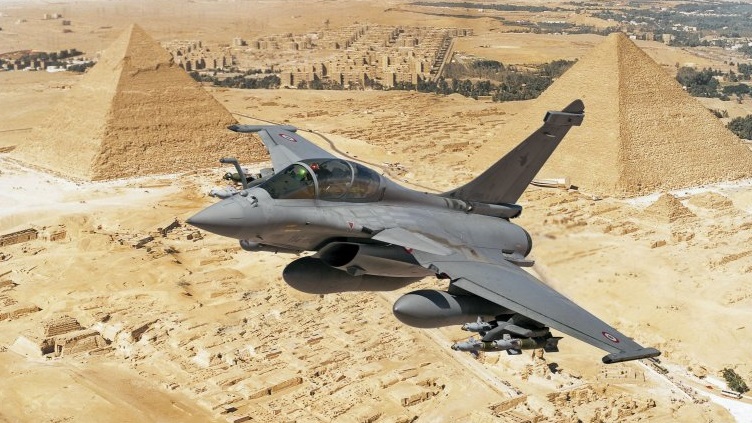To Ensure Israel’s Military ‘Advantage,’ Egypt Prohibited from Acquiring Beyond Visual Range Missiles
While Egypt's efforts to acquire the Eurofighter Typhoon and U.S-made F-15 fighter jets are likely to be greenlighted, especially after Germany had agreed to dropped its opposition to selling these fighter jets to Saudi Arabia, the most-populous Arab country nevertheless, will not be getting the "full package" in terms of its Beyond Visual Range weaponary.
(DEFENCE SECURITY ASIA) — In the past two or three years, Egypt and Italy have reportedly been engaged in negotiations for the acquisition of various types of weapons, including up to 24 Eurofighter Typhoon fighter jets valued at US$3 billion (RM13.5 billion) .
The Eurofighter Typhoon fighter jets are developed by a consortium of companies from the United Kingdom, Spain, Italy, and Germany.
In addition to the Eurofighter Typhoon fighter jets, Egypt also reportedly on the verge of obtaining a long-delayed approval from the United States to acquire F-15 “Strike Eagle” fighter jets, thus fulfilling 40-year-long aspiration to possess the frontline fighter aircraft.
If the presence of the Eurofighter Typhoon and F-15 is confirmed through the signing of contracts, both fighter jets will join the Egyptian Air Force, which already possesses 54 Rafale fighter jets from France’s Dassault Aviation and other fighter aircraft including from Soviet-era.
While Egypt’s efforts to acquire the Eurofighter Typhoon and U.S-made F-15 fighter jets are likely to be greenlighted, especially after Germany had agreed to dropped its opposition to selling these fighter jets to Saudi Arabia, the Western-friendly Arab country nevertheless, will not be getting the “full package” , especially in terms of its Beyond Visual Range weaponary.

Similar to what had happened during the acquisition of Rafale fighter jets from France, Egypt is expected to face the same fate if it opts for the Eurofighter Typhoon, meaning that Cairo will not be getting the “full package” oleh the fighter aircraft.
The Egyptian will likely be deprived from getting the “full package,” the Beyond Visual Range (BVR) air-to-air missiles like the “Meteor” BVR and other strategic weaponry attached to the aircraft.
The refusal by France and the United States to provide Egypt with the “full package” of Beyond Visual Range weaponary is mainly due to Paris and Washington insistance of maintaining Israel’s Qualitative Military Edge (QME) over Egypt and other Arab neighbours.
Although Israel may not object to the sale of Eurofighter Typhoon fighter jets to Egypt, there are indications that Israel may veto any sale of the “Meteor BVR” air-to-air missiles or any other makes of Beyond Visual Range missiles to Egypt.
A similar situation occurred when Egypt purchased Rafale fighter jets, where Israel opposed any French efforts to equip the fighter jets sold to Cairo with the Meteor Beyond Visual Range Air-to-Air Missiles.

As of now, the Egyptian Air Force’s Rafale fighter jets remain without the Meteor Beyond Visual Range Air-to-Air Missiles due to Israel’s objections, which aims to preserve its military superiority over Cairo.
Reports suggest that Cairo continues to press France to provide the Meteor Beyond Visual Range Air-to-Air Missiles.
Israel is reportedly concerned about the fate of its fighter jets, especially the F-16 and F-15, if Egyptian fighter jets equipped with the Meteor Beyond Visual Range Air-to-Air Missiles engage in armed conflict between the two nations.
In 2022, the highest-ranking official of the United States Central Command (CENTCOM) in the Middle East, General Frank McKenzie, announced the U.S. intention to supply F-15 fighter jets to Egypt.


Reports in 2022 stated that Israel supported the sale of F-15s to Egypt, but the situation may have changed given the tense relations between the two neighboring countries due to armed conflict between Tel Aviv and Palestine.
Although the United States “ended” Cairo’s 40-year wait for F-15 fighter jets, observers agree that Washington is unlikely to provide a full package for these aircraft, including the AIM-120 AMRAAM, another type of Beyond Visual Range air-to-air missiles to Egypt.
As usual, the United States cites opposition from Israel and the need to maintain Israel’s military superiority over its neighboring country as reasons for its reluctance to sell AIM-120 AMRAAM missiles to Egypt. – DSA



Comments are closed.